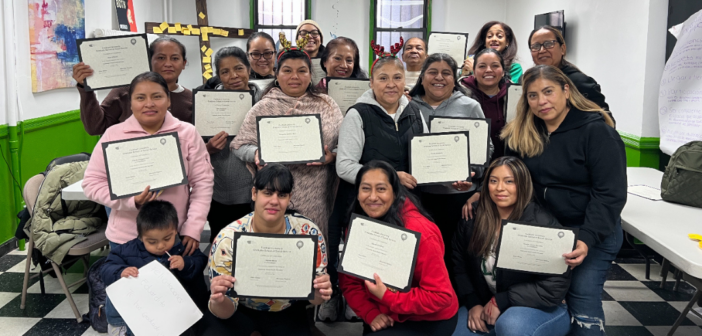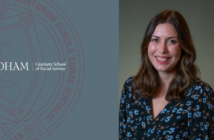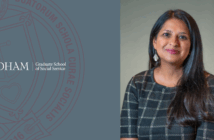Forced migration is a complex and traumatic experience, particularly for women. They must navigate a new country, often without resources or support. For most, the experience is overwhelming.
Addressing these complexities is nuanced and challenging, and it doesn’t seem to be getting easier anytime soon. However, there is a clear place to start: the need for community.
Her Migrant Hub (HMH), an initiative founded in 2021 by Fordham Graduate School of Social Service Professors Dana Alonzo, Ph.D., and Marciana Popescu, Ph.D., has tackled this need through a clear mission: enhance access to vital health care resources for women asylum seekers in New York City. And they’re achieving this through innovative programming that empowers women, fosters community, and trains future social workers.
“Her Migrant Hub started with 12 women and four [MSW] students,” Popescu said. “Now, we have close to 100 students and alumni that have been trained, and have worked directly with over 50 women, and the impact beyond those we work directly with reaches thousands.”
HMH’s focus on capacity building amplifies this impact. They are partnering with community organizations throughout the city, to maximize shrinking resources and retain and expand safe spaces for people with lived experiences of forced migration. For example, the group recently participated in an event organized by Grupos de Mujeres Latinas (GML), a group formed by the Belmont Catholic Community, at Fordham’s Rose Hill campus—selling scarves knitted by migrant women who live in the Bronx. Fordham’s Campus Ministry also partnered with the effort.
The scarves all sold out within two hours of the scheduled five-hour event. However, the real accomplishment was the motivation driving the mission — empowering women asylum seekers to become self-sufficient in an increasingly difficult world.
“What was really impressive about the event was that, at a time when folks were feeling scared and trying to stay out of the spotlight, this group said, ‘We are going to advocate and support,’” Alonzo said.
A Community By Migrant Women, for Migrant Women
HMH’s programs are driven by needs identified by the migrant women themselves. One such need was access to direct mental health support within the community. To be effective, however, the services couldn’t suffer from the traditional barriers of help-seeking, such as exposing the women’s immigration status, and lack of cultural responsiveness.
Alonzo and Popescu started a successful collaboration with GML, providing women asylum seekers in the area with mental health psychoeducation, training them to recognize symptoms, understand what the illnesses mean, and how they impact functioning on a daily basis. Once trained, the women could serve their communities as trusted peers—empowering others to shake the stigmas around seeking help and to create positive change in their lives.
“We’ve had more than one conversation where women have said, ‘I was one of those people saying, I have to take care of my kids. I can’t think about myself,’” Alonzo said. “[Then they realized], ‘I have to recognize that it’s not something I should feel guilty or ashamed of, or embarrassed to put my needs up there as well.’”
The most important aspect of this training model, Popescu said, is that it’s self-sustaining. The women from the first cohort, now providing peer services to their communities, train the incoming cohorts themselves. The demand for this programming is substantial — Alonzo said the third cohort of women filled “immediately.”
“The Mental Health Workshop has given me the opportunity to learn and know about certain topics that are still taboo in our Hispanic community, the simple fact of mentioning a mental health situation to someone is already a topic of debate,” said one of the participants. To suggest to the person who needs help, support, or guidance that they ‘get out’ of that situation only demonstrates the level of ignorance we have about the subject. We need to expose ourselves and know and apply more of the information that the professors and students of Fordham University brought us.”
The cohort model has provided an additional benefit: it serves as a training ground for upstart social workers. Alonzo and Popescu currently have Fordham Master of Social Work (MSW) student interns who assist with the intricacies of mental health psychoeducation. For women in the group who need more one-on-one support, the student serves as a guide. It benefits everyone; the migrant women have another outlet for emotional connection, and the student explores a unique opportunity to put their theoretical knowledge into immediate practice.
“My journey with HMH has been genuinely enriching as a social worker,” said Fordham M.S.W. student Gloria Figueroa, who graduates this May. “Through HMH, I gained invaluable mental health training that has profoundly impacted my practice with Latino clients. HMH has connected me with other organizations dedicated to human rights and mental health, allowing me to explore the spectrum of social work from macro to micro perspectives. I’m very grateful for all the opportunities that HMH has offered me, the powerful connections it has brought me, and for empowering me in this social work world.”
Creating “Grounds” for Safe Spaces
Alonzo emphasized HMH’s “bottom-up approach” as one of the pivotal keys to its success. Alonzo and Popescu aren’t leading the project as the proverbial “ivory tower” handing out instructions from the top of the hill. Rather, they’ve allowed the migrant women themselves to occupy the forefront. By centering women’s voices with lived experiences of forced migration, HMH ensures its initiatives are relevant and effective.
One such initiative currently in the works is the “Grounds” café project. Conceived by the women themselves as a means of generating sustainable income and fostering community, Grounds aims to be more than just a place to buy coffee. After a few MSW students and other HMH members made it to the final round of last year’s Fordham Foundry Annual Pitch Competition, the idea for a communal space to bond over a cross-cultural tradition—catching up over coffee or tea—began to gain momentum.
Inspired by the success of their pitch, the women got to work. They’ve secured a space, donations for coffee equipment, and have identified training to obtain the proper health certifications to serve food and drinks. Members across different parts of the Fordham community have also chipped in.
“Working with GML, we paired Fordham undergraduates with families in the community to have a ‘Big Brother, Big Sister’ mentorship program,” Alonzo said, “working with children on homework help and pathways toward higher education.”
Once Grounds is operational, Alonzo said, the space will host monthly gatherings centered around specific migrant communities—celebrating their cultures through guest speakers.
“The idea was this was an opportunity for folks to come together and learn from one another,” Alonzo said. “The women activists who came up with this idea said, ‘We’re so focused on differences and not belonging. We need to change that narrative to, We actually have more in common than we might realize.’”
The Ramily Resilience
The new Presidential administration has placed grant-funded programs like HMH in a perpetual state of uncertainty. Popescu and Alonzo are actively exploring funding possibilities, and working toward supporting HMH in developing income-generating programs that could provide some level of sustainability.
Additionally, members of the Fordham Community have lent their support while HMH seeks new opportunities. Popescu and Alonzo are heading the operation on top of their full course loads as professors. Campus Ministry has helped with outreach efforts to recruit volunteers, and the Law School has provided pro bono legal assistance and training. A GSS alumni is currently assisting with grant proposal writing. The community knows the work is worth it.
“All the logistics and administration of the programs is done by us, the students, and the women,” Popescu said. “It’s been taxing, but rewarding at the same time.”
HMH’s dedication to sustainability and innovation is evident in its ongoing efforts to develop new programs and partnerships. The team has even created a series of animated videos to provide information on legal rights and resources, with voice-over translations in multiple languages. These are particularly valuable for those with limited literacy skills and limited English proficiency. As for the Grounds café, Alonzo thinks the model could scale to a network of similar spaces throughout the city where community is needed most. She is excited for opening day, scheduled for this spring.
Despite a dizzying start to the year, HMH has stuck to its mission. It provides mental health resources and support to the migrant community. It educates MSW students through dedicated coursework and field internships with various community partners across the five boroughs. And it fosters an inclusive community based on trust and self-sufficiency.
“HMH provided me with unique opportunities to connect directly with asylum seekers, migration scholars, and service providers who worked directly with asylum seekers in NYC, to learn about forced migration and its impact on the lives of individuals and communities, beyond a textbook and a classroom,” said Cynthia Pai, GSS ’24, who interned with HMH as a Fordham M.S.W. student. “Now, as a social worker and community mental health clinician, I continue to use my experiences with HMH as a framework for how I hope to work with individuals in marginalized communities, ensuring that at the heart of my work is their lived experiences.”
If you would like to support Her Migrant Hub and its mission, please visit hermigranthub.org or email Alonzo or Popescu directly at dalonzo1@fordham.edu and popescu@fordham.edu



